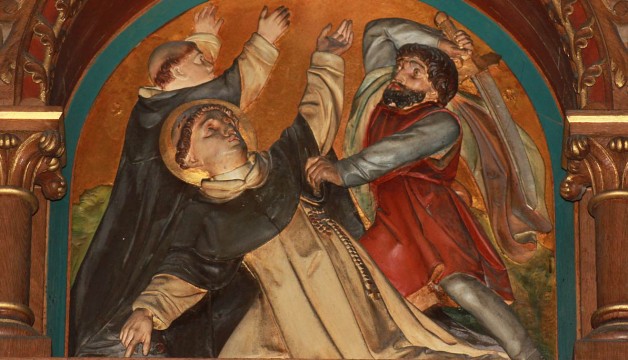What have you been learning in school? This question is as much the scourge of school-aged children as it is the conversational crutch of their older relatives. Usually the answer is inconsequential. Just another awkward moment as the young learn the art of conversation. But for one precocious boy named Peter, his answer, Credo in unum Deum . . . (the Apostle’s Creed), would foreshadow a life lived in service of the Gospel.
Peter’s family was Cathar, which meant that they believed in two gods: a good god who created the spiritual world, and an evil god who created the material world. Despite his family’s tremendous efforts to convince him that the devil created matter, Peter insisted that “there is but one first principle, the supreme God, omnipotent, and the sole Creator of heaven and earth. Whoever does not believe this truth cannot be saved.”
His irate uncle urged Peter’s father to remove him from Catholic school, lest he one day destroy their religion. Peter’s father, however, took pride in his son’s success, and allowed him to continue.
Eventually, Peter enrolled at the university in Bologna, where he met Holy Father Dominic and joined the Order of Preachers, which was in part founded to combat the Catharist heresy. Just before Dominic’s death, Br. Peter was clothed in the habit of the friars preachers by the founder himself.
Peter was ordained to the priesthood and became a celebrated preacher. He was known for his holiness and is said to have converted thousands to Christianity from Catharism. Peter was made an inquisitor by the pope and given the task of rooting the Cathar error in northern Italy. Aided by the gift of miracles, he was extremely successful at bringing former heretics into the fold.
On April 6, 1252 as Peter walked with a companion from Como, where he was prior, to Milan, where he was to preach, an assassin hired by the Cathars stabbed Peter in the head with a pruning knife. As the assassin and his assistant were beating Peter’s companion, the dying friar wrote with his own blood the first words of that prayer he had learned as a child: Credo. Peter’s powerful profession of faith, which in the moment only increased his murderer’s rage, eventually brought the man to repentance: Carino, Peter’s assassin, would join the Order himself as a lay brother, living such a fervently penitential life that friars called him “Blessed Carino” after his death.
St. Peter of Verona, whose feast the Order commemorates today, shows us that we can find the faith even when we grow up in a culture that despises it. God gave St. Peter the grace to avoid the error of his family and neighbors. He was able to see that the one good God created all that there is, even though those around him saw the world as evil, as hopeless.
We too face a culture that sees a radical disconnect between the spiritual and the physical, one where the apparent evils of the world lead many to deny that God is good; and unlike St. Peter, for many of us Credo in unum Deum is not what we’ve been learning in school. Let us pray, then, for the grace that St. Peter received, to see that God is creator of all and that by following Jesus, God incarnate, we may find our own salvation. May God grant us the grace to serve, just like St. Peter, as instruments of conversion amongst our families, our friends, and our neighbors, drawing them back to the saving truth of the faith.
St. Peter of Verona pray for us.
✠
Image: Martyrdom of St. Peter of Verona, St. Nicholas Church (Friesach, Austria)







